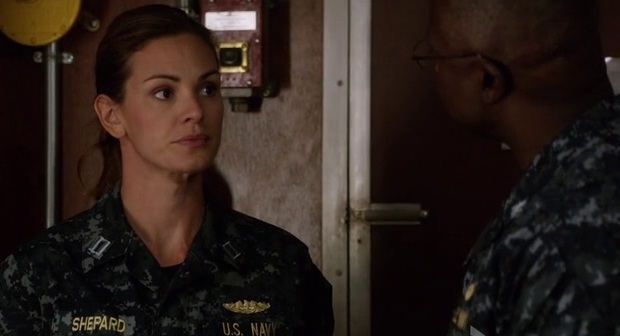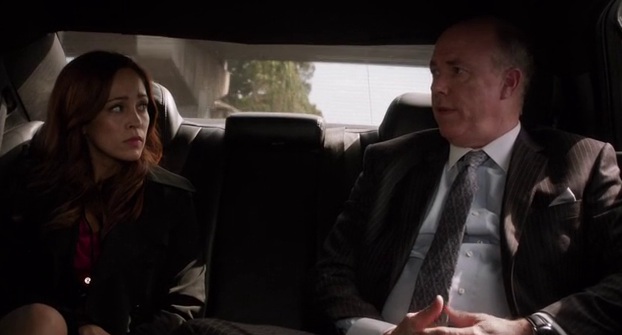The Pointy End of the Spear had an appealing sense of symmetry, which wasn't because of the obvious dependency between the events on Sainte Marina and those in Washington D.C., but rather because of the similarity between the mutiny on the island and the threat to the U.S. democracy in the American capital. The two parallel chains of events were essentially attempts at coup each unfolding with a formal gathering as backdrop.
The Sun and Moon festival might have felt a bit contrived, like so many things about the island, but it provided the storylines in Sainte Marina with what they needed to match D.C.'s televised joint session of Congress. As characters verbally sparred while the island prepared for the festival, in D.C., the co-conspirators did the same, though with a more restrained display of emotions.
In most of the previous episodes, the captain has been depicted as a man of influence with the reputation of being smart and a excellent leader. Although the series has shown a few times that there might be some truth to that, The Pointy End of the Spear is the first episode where the writing and Andre Braugher's performance have confirmed it throughout the whole episode, and without the type of inconsistencies that have plagued the story until now. Chaplin's conversation with the Chinese envoy is a perfect example as the captain used the right amount of threat and was ready to listen when Zheng became reasonable. He brought Grace to his side (not that she wasn't with him in the first place) by finally giving her what she had wanted above all, his trust. That scene was particularly well written as it touched on values Grace has been fighting all her adult life for.

While the XO managed to be at the heart of the action for most of the previous episodes, The Pointy End of the Spear turned things around, and even scenes featuring Sam seemed more about others. Chaplin gave the XO the chance to think about what he wanted more than once, but Sam was too far gone in his own fantasy to turn back. Unfortunately for the episode, the XO brought down with him parts of the story. Many things in Last Resort don't pass the test of reason, but James King's accepting to take out U.S. soldiers just because Sam asked kindly was too much, even for a show like this. Also, the COB's mutiny helped with the drama between the captain and his XO, but seemed to amount to very little else.
The scene involving the two men and Lt. Shepard's flares during the festival had a very distinctive soap opera-esque feel to it, but it worked. In fact, all the hushed conversations (veiled threats or not) and all the scheming that took place during the celebration could happened only because everybody on the island was at the gathering. The festival provided the kind of backdrop that makes even the most stupid storyline feel dramatic. I mean, what sense was there in the COB's men parading around with weapons? But then again, you might say it made sense because everyone seemed to know about the mutiny!
In the same vein, events in D.C. resonated well, even though their premise was faulty and the execution, at times, left a lot to be desired. The emotional farewell between Admiral Shepard and his daughter was about the only thing that could not be tainted by other events. I liked how the story portrayed the pressure on Kylie, first through her attitude with her boyfriend, then with her expressing her doubts to the admiral. That conversation (where she considered herself nothing more than "a very good gun salesman") showed through the words of Shepard how far Kylie had come. As if to confirm it, the young woman readily volunteered for a dangerous mission to the capitol, proving that she was more a revolutionary than she might have thought. I find it interesting that she repeatedly called herself a salesman and not a saleswoman, which somehow fits very well with what we've seen of the character so far in her male-dominated family and political world.

The speaker's nonsensical address and his suicide could definitely have been better. In fact, the events in D.C. were so poorly handled that Kylie's rescue by her father seemed much better than it was. Sinclair's influence was established with the way he protected his daughter and his appointment on Air Force One. A personal favorite was his "Heck, I admire the effort", showing how for him all this was just a game of power and not one of political conviction, which brings us back to what appears as the biggest failure of the episode and possibly the series.
Last Resort started with an incident showing the U.S. manufacturing reasons to go to war, and we have been following the fallout of that ever since. The show overreached with a coup as a way to solve its heroes issue, but seemed to lack the artistic courage to carry through with it. The coup was the wrong choice because it has no grounding in reality, but once the idea was floated, making it fizzle the way the episode did seems like a waste of good characters. The show chose the easy way out, preserving the U.S. democracy that should never have been threatened in the first place. In spite of all that, because of its structure and the way Chaplin and the Sinclairs played their parts, the story flew well enough.